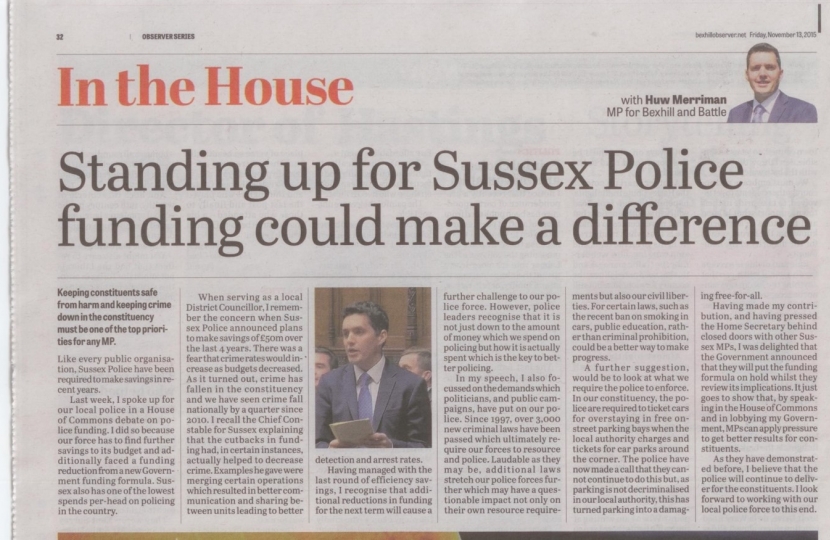
Keeping constituents safe from harm and keeping crime down in the constituency must be one of the top priorities for any MP. Like every public organisation, Sussex Police have been required to make savings in recent years. Last week, I spoke up for our local police in a House of Commons debate on police funding. I did so because our force has to find further savings to its budget and additionally faced a funding reduction from a new Government funding formula. Sussex also has one of the lowest spends per-head on policing in the country.
When serving as a local District Councillor, I remember the concern when Sussex Police announced plans to make savings of £50m over the last 4 years. There was a fear that crime rates would increase as budgets decreased. As it turned out, crime has fallen in the constituency and we have seen crime fall nationally by a quarter since 2010. I recall the Chief Constable for Sussex explaining that the cutbacks in funding had, in certain instances, actually helped to decrease crime. Examples he gave were merging certain operations which resulted in better communication and sharing between units leading to better detection and arrest rates.
Having managed with the last round of efficiency savings, I recognise that additional reductions in funding for the next term will cause a further challenge to our police force. However, police leaders recognise that it is not just down to the amount of money which we spend on policing but how it is actually spent which is the key to better policing.
In my speech, I also focussed on the demands which politicians, and public campaigns, have put on our police. Since 1997, over 3,000 new criminal laws have been passed which ultimately require our forces to resource and police. Laudable as they may be, additional laws stretch our police forces further which may have a questionable impact not only on their own resource requirements but also our civil liberties. For certain laws, such as the recent ban on smoking in cars, public education, rather than criminal prohibition, could be a better way to make progress.
A further suggestion, would be to look at what we require the police to enforce. In our constituency, the police are required to ticket cars for overstaying in free on-street parking bays when the local authority charges and tickets for car parks around the corner. The police have now made a call that they cannot continue to do this but, as parking is not decriminalised in our local authority, this has turned parking into a damaging free-for-all.
Having made my contribution, and having pressed the Home Secretary behind closed doors with other Sussex MPs, I was delighted that the Government announced that they will put the funding formula on hold whilst they review its implications. It just goes to show that, by speaking in the House of Commons and in lobbying my Government, MPs can apply pressure to get better results for constituents.
As they have demonstrated before, I believe that the police will continue to deliver for the constituents. I look forward to working with our local police force to this end.


